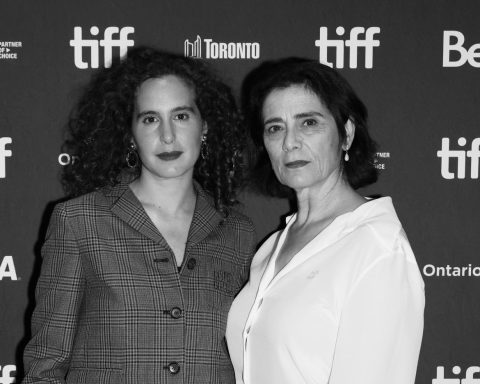In her first feature, The End We Start From, starring Jodie Comer among many other thesps, British director Mahalia Belo follows a woman and her newborn child as they find their way home after an environmental crisis submerges London by flood waters. The profound novelty of motherhood is brought into sharp focus in this intimate and poetic portrayal of family survival adapted by screenwriter Alice Birch from Megan Hunter’s eponymous 2017 novel. The film plays at the Toronto International Film Festival.
Belo read the book many years ago and it got under her skin in a way she hadn’t experienced before, but she was worried about how it might be adapted for the screen. Later, Birch wrote a draft of the adaptation, “and it was phenomenal. It was so well-told, so concise. It moved in this very formal, interesting way. And I found [that] creatively it felt really bold – really, really bold. And then, I got asked if I wanted to do it, I said, ‘Hell yes!’ she says of how she got on board The End We Start From.
The film is a cautionary tale in which the characters move through various episodes of social, psychological and physical collapse, making for an immersive viewing experience, especially from the point of view of new motherhood, “That is a very particular time. It’s that journey between having your first child for that first year, and you’ll never get back again, and it feels like such a hazy time. I almost had forgotten it,” she shares, adding that she wanted there to be joy and hope, “Actually, it was almost kind of heartbreaking in its own way that when worse things are happening, the baby is smiling. And that’s true to life as well. Because I wanted to honor that experience as well.”
Belo thinks the idea of the film is that everything is cyclical. She also wished to honor grief and male vulnerability as well as female strength, “I also feel like what was integral to this relationship was that she had been through something she had really put behind we find out towards the end of the film. She lost both her parents already, and he had helped her. And I think the fact that she had already been through something and then moves through this story with that behind her is part of that cyclical journey, so he had to go through something,” she says.
The End We Start From has a female gaze. “What is this gaze?” asks Belo. “I was centering the whole thing through women’s eyes and through the women’s subconscious. So, that’s what I was firmly stuck to. In some ways, for me, part of my modus for telling the story was that the Woman is the flood. That is her. Everything about that water is almost exactly what’s running through her as well. Whenever we see what’s happening visually in the outside world, especially when it comes to the flood, it is coming directly from her.”
She likens the flooding to giving birth, “The first moment is obviously the birth. It’s subjective. It’s the true experience, as well as that subjective experience of that freefall that happens when your surges of birth run through you,” she explains.
“Because I seem to remember, the only way I ever got through that experience was to sort of submit to that and that submission I wanted to depict. And then, she says: ‘Shush’ and the camera moves away and you see the receiver. So it felt like it was true to her all the way through, which I think is how the apocalyptic quality is told. I want it to be incredibly immersive.”
Belo hopes the film begs the question of what could happen to us if we don’t react fast enough to save the planet. According to her, that hope also connects people, “What I hate is the idea that it’s hopeless, and there’s nothing we can do and there’s no moving forward because as a kind of global community, we’ve been through something and when something traumatic happens like that to a global community, we don’t meet each other. At the same time, I didn’t want to gloss over the fact that those events, we as a community need to grieve them as well,” she says.
Asked about the situation of women in film today, Belo states that she is proud that the film got made, “I feel it’s quite inspiring that we managed to make this. I feel like there is a future for female directors… We’re making movies and that’s super exciting. So, I feel positive.” she concludes.
Photo credits: Jamie Simonds/BAFTA Getty.
This interview was conducted in person at the 2023 Toronto International Film Festival.










